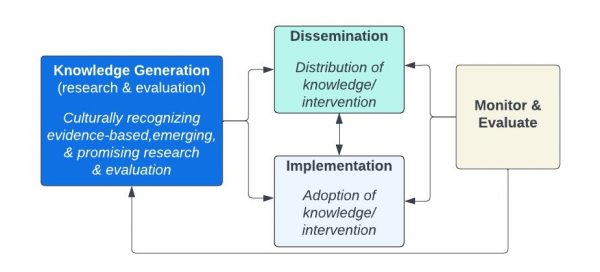Dr. Jade Metzger
I learned about tornadoes with boxed cake in second grade. It was probably sometime around April or May when Mrs. Hopping unloaded milk, eggs, butter, and box cake mix from her big canvas bag, divided the ingredients between herself and the college-student aide, and split the classroom into two groups. “Today,” she said, “we’re going to learn about tornadoes!”
I cannot tell you all the details of the lesson. However, at the end of class, I knew that a tornado watch meant that all the “ingredients” to make a tornado were present in the atmosphere and could be mixing or they could be baking. A tornado warning, however, meant the tornado was fully “baked” and ready to come out of the oven.
Mrs. Hopping was a great teacher for 7–8-year-olds. She knew that if you wanted children to learn something and remember it, then you had to teach them something significant in a way they would understand. You had to translate your knowledge to them.
Actual knowledge translation (KT) is a bit more complicated than boxed cake. Knowledge translation is a multi-faceted, multi-stage, non-linear process examining how people and organizations with knowledge can share significant information with target audiences, often with the goal of sustaining behavioral or attitudinal change in those audiences. At IHD, we have a KT workgroup, which is composed of individuals from various teams across our institute who have dedicated time and effort to understanding what KT is, how IHD is doing KT now, and how IHD can do KT better to promote the full inclusion of persons with disabilities in all aspects of the human experience. Below is a brief summary of what KT is, what our KT workgroup has been discussing, and what goals guide our efforts.

The KT workgroup formed in early fall 2023 and currently includes 10 individuals from various teams at IHD. The group meets monthly, and we have two main goals which guide our efforts. First is to compile resources and synthesize ongoing KT efforts already happening at IHD into a “toolkit.” Our second goal is to identify and highlight two examples of exemplary which could serve as whole visions of what could be produced from the tools assembled in the toolkit.
We decided to start by determining the characteristics of knowledge translation. KT is an ongoing process, with different steps/phases informing the next. It centers knowledge (often shorthand for “research”) as either the starting point or as the center of the model. It highlights the need to monitor and evaluate the effectiveness of KT efforts to change behaviors and attitudes.
The KT workgroup is well into our second stage, where we are presenting the KT efforts happening at IHD. Thus far, we have had presentations on proposed KT in grant writing with accessible STEM education, evaluation measures trainings through for the American Indian Vocational Rehabilitation Training and Technical Assistance Center (AIVRTTAC), and workshops being develop by the Providing Accessible Training and Home Support for Parents with Intellectual Disabilities (PATHS) project.